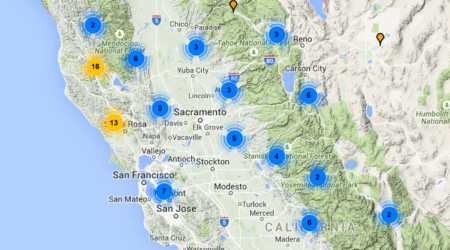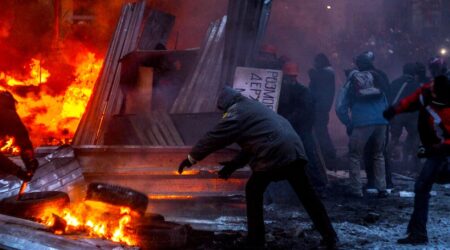On October 12, 2014, Evo Morales was elected to a third term as president of Bolivia, a country that has seen a substantial drop in poverty since his first election in 2006. As part of his popular appeal, Morales, a former coca grower of indigenous descent, has promised to redistribute the country’s gas wealth, which now funds a range of social programs and infrastructure projects. He also campaigned as a champion of Bolivia’s large and diverse indigenous population, vowing to meet their longstanding demands for “territory and autonomy.”
But in practice, yet these two agendas are in many ways incompatbile, according to research by Penelope Anthias, the 2014-2015 Ciriacy-Wantrup Postdoctoral Fellow in Berkeley’s Department of Geography. Anthias’ doctoral research examines the dynamics of indigenous territorial claims in Bolivia’s gas-rich Chaco region, where she completed two years of fieldwork. Anthias wanted to find out “how far the indigenous peoples have gotten in terms of achieving what they wanted.”
Her research shows just how complicated Bolivia’s internal struggles over rights, land, and money have become. Anthias first arrived in the Chaco in 2008, when Morales’ policies were gaining momentum. The Guaraní people of the Chaco had “mobilized around territory”, Anthias says, “but they still faced many challenges.” While they had gained state recognition of their collective land claims as communal lands of origin (tierras comunales de origen, or TCOs) during the 1990s, this turned out to be just the first step in a long and complex legal process.
In Itika Guasu, the TCO where Anthias completed her fieldwork, this process has been characteristically plagued with problems. Non-indigenous cattle ranchers—some of whom previously used unpaid Guaraní labour—claim private properties within the TCO, often on the most productive plots of land. Legally, such private rights are recognized, as long as the claimants can demonstrate productive land use. In practice, even absentee landlords have had their claims recognized, often through corrupt practices and influence within regional institutions.
In other words, even when indigenous rights are recognized in law, entrenched colonial power relations may prevent their implementation. In the Chaco, where indigenous people were until recently enslaved on private haciendas, inequalities persist. Today, TCO Itika Guasu remains fragmented and unfinished, with most land still in the hands of private, non-indigenous ranchers.
A Battle for Gas and Land Rights
Just as history has complicated the Guaraní claims, so have more current developments: TCO Itika Guasu sits on top of Bolivia’s largest natural gas field. During the 1990s, just as the land titling process was getting underway, the oil company Repsol began developing these gas reserves. Anthias explains that the company avoided consulting the Guaraní by making land-use contracts with private landowners, a process aided by the land reform agency’s “premature certification” of these private property rights.
“Around 2003, the Guaraní caught on to this,” Anthias says, “and started to campaign for their rights to consultation, compensation, and environmental impact assessments.” With Morales’ 2005 election, they had hoped for some support from their government. Instead, they found themselves accused of being an “obstacle to Bolivia’s energy development”.
This campaign became transnational when a group of Guaraní leaders travelled to Repsol’s headquarters in Spain and made contact with a group of international lawyers. In 2010, Repsol agreed to pay $14.8 million into an investment fund established for the Guaraní of Itika Guasu, as well as “formally recognising their rights to their territory”, Anthias says. Leaders in Itika Guasu now see such negotiations as an alternative route to maintaining their territory and autonomy, given the failure of the state land-titling process.
Yet these negotiations have left Guaraní leaders increasingly distant from their home communities, and local participation declined throughout the process. “The process of the negotiations was very legalistic,” Anthias says. “In 2009, there were lots of community assemblies, people giving input on the political process. In 2011 there were none.”
The result has been friction within villages like Tarairí, where Anthias spent six months. “Some people think the leaders are off getting rich while they have the same daily struggles,” she observes. “Written territorial recognition by an oil company does not solve their problems of accessing land and resources.”
Some community members are also keen to benefit from Morales’ “redistributive, extractive economy”, which recently saw the arrival of electricity to Tarairí’s thirteen small homes. Such projects have been held up by lengthy negotiations with the territory’s Guaraní leadership, who are now demanding prior consultation from state institutions and private companies alike. Others remain hopeful that the investment fund will one day deliver Guaraní-managed development projects.
What this story shows, Anthias says, is that, for efforts to decolonize indigenous regions through land reform—a model that has been used from Arctic Canada down into South America—state recognition of territorial claims and changes to official maps are just the beginning. “There is a gap between making new maps and where they really lead,” she says. “It gets very messy”.
Although the Chaco has its unique characteristics, nearly all indigenous peoples across the Americas face a similar core challenge: they share their territories with other local actors and/or face some form of extractive industry development.
“Global discourses of indigenous development often overlook these realities”, Anthias observes. “Indigenous peoples are forced to confront them”.
While many people expected that the election of an indigenous president would resolve indigenous land claims, the state is just one actor when it comes to struggles over territory, Anthias says. In some places, transnational or sub-national actors may play a greater role, challenging the idea that territory can simply be demanded from, and awarded by, the state—a lesson that Guaraní leaders in Itika Guasu seem to have absorbed.
Pulling on the Threads
For Anthias, piecing together this messy story of Bolivian past and present has required a wide range of social-science methods. Anthias conducted long, open-ended interviews with everyone from state officials to oil company workers and cattle ranchers. She spent time observing the work of local NGOs and indigenous assemblies, and she read through piles of official documents and legal reports. “A lot of this [kind of] research is about hanging around, taking opportunities, and building trust,” she says.
During her six months in Tarairí, Anthias spent time collecting palm and milling maize with local women in order to understand the “lived realities of land and territory”. She broke her leg playing football in the community, which has no hospital. “It took 24 hours to get to treatment,” she recalls. “I managed to get a lift from a truck to a village where I could get a bus.” Anthias spent a night waiting for the bus, and then had more than seven hours of transit time left. “That was interesting,” she says. When she returned to the community, she was on crutches for four months. “I volunteered at the school,” she says, “and just went house to house, drinking mate and asking questions about land.”
Now at Berkeley, Anthias is turning her years of fieldwork into a book manuscript, and trying to stay true to the complexities she saw in the Chaco. “There are a lot of threads in this story,” she says, and the Berkeley campus “is a great place to pull on them and see what happens.”
To learn more about Penelope Anthias’ research, see http://berkeley.academia.edu/PAnthias.
Photo Credit: World Bank Photo Collection “Bolivians listen to President Evo Morales speak at the Rural Alliance Fair in Cliza, Bolivia on July 6, 2013. Photo © Dominic Chavez/World Bank“



